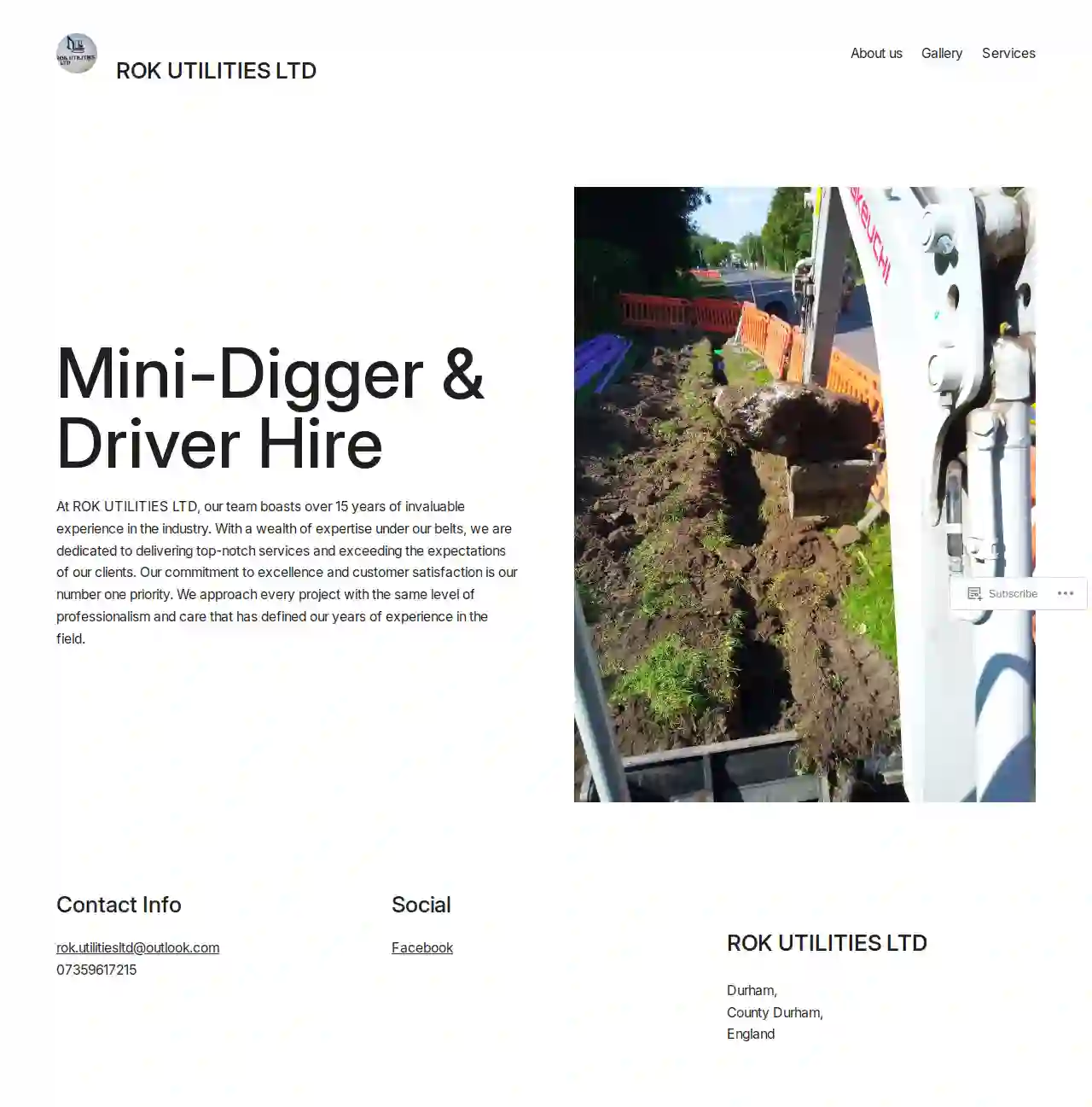Excavation Contractors Barnard Castle
Top 10 Excavation Contractors in Barnard Castle
Receive 3 FREE Excavation Contractors quotes for your project today! Compare profiles, reviews, accreditations, portfolio, etc... and choose the best service.

Rok utilities ltd
51 reviewsDurham, County Durham, GBAbout ROK UTILITIES LTD At ROK UTILITIES LTD, our team boasts over 15 years of invaluable experience in the industry. With a wealth of expertise under our belts, we are dedicated to delivering top-notch services and exceeding the expectations of our clients. Our commitment to excellence and customer satisfaction is our number one priority. We approach every project with the same level of professionalism and care that has defined our years of experience in the field.
- Services
- Why Us?
- Gallery
Get Quote
JW Plant Hire & Excavation
54 reviewsDurham, GBJW Plant Hire & Excavation We are a reliable and hardworking family run business, located in County Durham. Providing excavation services and micro plant machinery hire, in and around the North East of England. I'm committed to providing a high standard of service. No matter the size of the job, I guide my clients every step of the way and offer highly competitive rates. Take a look at my services below and call me today to schedule an initial consultation.
- Services
- Why Us?
- Gallery
Get Quote
Brambledown Landscape Services Ltd
12 reviewsDurham, GBWelcome To Brambledown Brambledown Landscape Services Ltd have 50 years experience in providing Award winning commercial Landscape Environmental Improvement schemes across the UK. Our specialist Landscape work has vastly improved numerous public spaces, particularly Historic Parks, Community gardens, National Parks, Botanical Gardens and Town Parks. Recognising the time and money spent invested in these projects, Brambledown Landscapes have ensured that every Environmental Improvement scheme that we are involved in, meets our strict high level quality procedures in line with Achilles Building Confidence Level 4 Status, ISO 9001, Constructionline Gold & CHAS.
- Services
- Why Us?
- Gallery
Get Quote
G M H Mini Plant Hire & Groundworks
High Hillside Farm, Houghton Le Spring, DH5 8BG, GBWelcome to G M H Mini Plant Hire & Groundworks, a trusted family-run business with a proud 9-year legacy. Serving Newcastle, Houghton Le Spring and beyond, we have earned an excellent reputation for plant hire and groundworks excellence. At G M H Mini Plant Hire & Groundworks, we provide professional and swift service, always maintaining the highest quality standards. Our communication with customers is exceptional, ensuring a smooth experience from beginning to end. A guarantee of superior work backs each project we undertake. Our business thrives on customer satisfaction and positive referrals. With a history of inventive designs, effective problem-solving, and attention to detail, we aim to meet and surpass the expectations of every customer. From minor domestic tasks to extensive commercial projects, we handle each job with precision and care. We are also proud members of the Construction Plant-Hire Association and hold certifications like the First Aid Awards Ltd Emergency First Aid at Work Level 2 Award and the Construction Skills Certification Scheme.
- Services
- Why Us?
- Accreditations
- Testimonials
- Gallery
Get Quote
Herrington Landscapes Ltd
522 reviewsDurham, GBHERRINGTON LANDSCAPES Bespoke garden design & installation With over 14 years of experience Herrington Landscapes can work with you to create a bespoke garden design & installation. Let us take care of your dream garden.
- Services
- Why Us?
- Testimonials
- Gallery
Get Quote
GROUNDWORKS DIRECT LTD
2.712 reviewsDurham, GBWhat is Plesk? Plesk is a hosting panel with simple and secure web server, website and web apps management tools. It is specially designed to help web professionals manage web, DNS, mail and other services through a comprehensive and user-friendly GUI. Plesk is about intelligently managing servers, apps, websites and hosting businesses, on both traditional and cloud hosting.
- Services
- Why Us?
Get Quote- Wi
Wilf Husband
4.68 reviewsDurham, GB- Services
- Why Us?
Get Quote - Bi
Bishop Middleham Quarry
4.766 reviewsDurham, GB- Services
- Why Us?
Get Quote 
H. E. Services (Plant Hire) Ltd
53 reviewsDurham, GB- Services
- Why Us?
Get Quote- Le
Les Brown Excavating Ltd.
55 reviewsDurham, GB- Services
- Why Us?
Get Quote
Over 13,059+ Excavation Contractors on our directory
Our excavation experts operate in Barnard Castle and surroundings!
ExcavationHQ has curated and vetted Top Excavation Businesses in Barnard Castle. Find a top & reliable pro today.
Frequently Asked Questions About Excavation Contractors
- Determining Soil Suitability: Assessing whether the soil can support the intended structure or load.
- Recommending Foundation Types: Advising on the appropriate foundation design based on soil characteristics.
- Addressing Drainage and Erosion Issues: Providing solutions to manage water runoff and prevent erosion.
- Evaluating Slope Stability: Assessing the risk of landslides or soil movement on slopes.
- Building on challenging soil types (expansive clay, loose sand, etc.)
- Constructing large or complex structures
- Excavating near slopes or retaining walls
- Addressing drainage or erosion concerns
- Planning and Surveying: Defining the excavation area, marking utility lines, and determining the required depth and grade.
- Site Preparation: Clearing vegetation, removing obstacles, and ensuring site accessibility.
- Excavation: Using appropriate equipment (excavators, backhoes, etc.) to remove earth and create the desired excavation.
- Hauling and Disposal: Transporting excavated material to designated disposal sites, complying with environmental regulations.
- Backfilling and Compaction: Refilling the excavation with suitable material and compacting it to achieve the required density and stability.
- Grading and Finishing: Leveling and shaping the surface to the final grade for landscaping or construction.
- Excavators: Versatile machines with a bucket, arm, and rotating cab for digging, lifting, and moving earth.
- Backhoes: Similar to excavators but with a digging bucket on the back and a loader bucket on the front, ideal for trenching and smaller excavations.
- Bulldozers: Powerful machines with a large blade for pushing earth, clearing land, and leveling surfaces.
- Skid Steers: Compact and maneuverable loaders with various attachments (buckets, forks) for digging, loading, and grading in tight spaces.
- Trenchers: Specialized machines for digging narrow trenches for utilities.
- Dump Trucks: Vehicles for hauling excavated material to disposal sites.
- Sloped Property: Your property has a significant slope, making it prone to soil erosion or landslides.
- Creating Usable Space: You want to level off a sloped area to create a flat surface for patios, gardens, or other outdoor spaces.
- Preventing Damage: Erosion is threatening existing structures, driveways, or walkways.
- Landscaping Features: You're incorporating tiered gardens, raised beds, or other landscaping elements requiring soil retention.
What is a soil engineer, and do I need one?
What is the excavation process?
What equipment is used for excavation?
How do I know if I need a retaining wall?
What is a soil engineer, and do I need one?
- Determining Soil Suitability: Assessing whether the soil can support the intended structure or load.
- Recommending Foundation Types: Advising on the appropriate foundation design based on soil characteristics.
- Addressing Drainage and Erosion Issues: Providing solutions to manage water runoff and prevent erosion.
- Evaluating Slope Stability: Assessing the risk of landslides or soil movement on slopes.
- Building on challenging soil types (expansive clay, loose sand, etc.)
- Constructing large or complex structures
- Excavating near slopes or retaining walls
- Addressing drainage or erosion concerns
What is the excavation process?
- Planning and Surveying: Defining the excavation area, marking utility lines, and determining the required depth and grade.
- Site Preparation: Clearing vegetation, removing obstacles, and ensuring site accessibility.
- Excavation: Using appropriate equipment (excavators, backhoes, etc.) to remove earth and create the desired excavation.
- Hauling and Disposal: Transporting excavated material to designated disposal sites, complying with environmental regulations.
- Backfilling and Compaction: Refilling the excavation with suitable material and compacting it to achieve the required density and stability.
- Grading and Finishing: Leveling and shaping the surface to the final grade for landscaping or construction.
What equipment is used for excavation?
- Excavators: Versatile machines with a bucket, arm, and rotating cab for digging, lifting, and moving earth.
- Backhoes: Similar to excavators but with a digging bucket on the back and a loader bucket on the front, ideal for trenching and smaller excavations.
- Bulldozers: Powerful machines with a large blade for pushing earth, clearing land, and leveling surfaces.
- Skid Steers: Compact and maneuverable loaders with various attachments (buckets, forks) for digging, loading, and grading in tight spaces.
- Trenchers: Specialized machines for digging narrow trenches for utilities.
- Dump Trucks: Vehicles for hauling excavated material to disposal sites.
How do I know if I need a retaining wall?
- Sloped Property: Your property has a significant slope, making it prone to soil erosion or landslides.
- Creating Usable Space: You want to level off a sloped area to create a flat surface for patios, gardens, or other outdoor spaces.
- Preventing Damage: Erosion is threatening existing structures, driveways, or walkways.
- Landscaping Features: You're incorporating tiered gardens, raised beds, or other landscaping elements requiring soil retention.